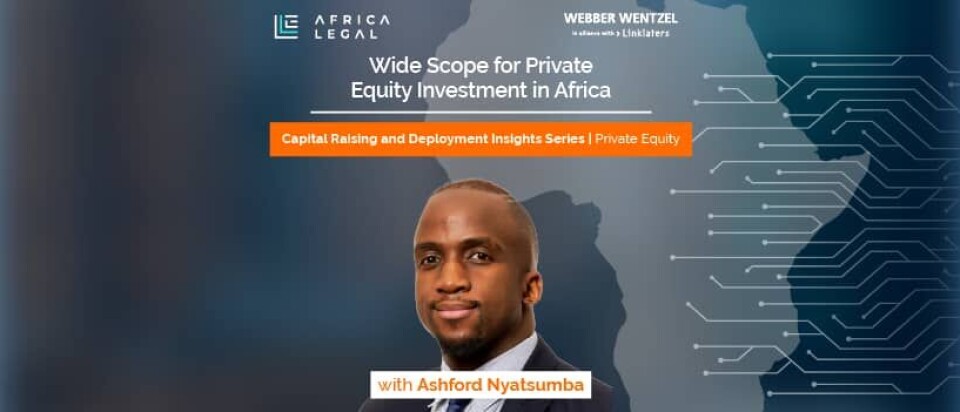Copyright : Re-publication of this article is authorised only in the following circumstances; the writer and Africa Legal are both recognised as the author and the website address www.africa-legal.com and original article link are back linked. Re-publication without both must be preauthorised by contacting editor@africa-legal.com
Wide Scope for Private Equity Investment in Africa

Ashford Nyatsumba is a partner in Webber Wentzel’s investment funds practice. He spoke to Chipo Muwowo about an exciting deal he was recently involved in, the challenges of capital raising, and what client success looks like to him.
In December 2021, Alitheia IDF, a women-focused private equity (PE) manager, announced the final close of its latest $100 million fund. The announcement was a huge moment for the Alitheia IDF team and their investors. Someone else who was sitting proudly on the sidelines was Ashford Nyatsumba, an expert in investment funds and fund formation, who acted as legal advisor for the team at Alitheia IDF.
Development finance institutions are active investors in the African PE space and many are tapping into this specific opportunity and trend. Apart from gender-lens investing, what other trends has Nyatsumba observed?
“We’re starting to come out of the two-year lull occasioned by Covid. After existing assets took a knock, deal flow dried up, and many traditional investors kept their powder dry, but it’s increasingly starting to feel like a new dawn,” he commented. “Some fund houses started establishing specialist recovery funds to drive up deal activity.”
Looking out to the wider African PE universe, complex cross-jurisdictional deals are becoming more common, and policies such as the African Continental Free Trade Area (AfCFTA) will only speed these up. This comes with challenges, though.
“Investors prefer jurisdictions where they know what to expect. That’s often tied to where English common law is exercised,” explained Nyatsumba who recently acted for a francophone Africa-based private equity manager.
“In francophone Africa, for example, you need your legal agreements in English and French, and that can create an additional administrative burden on managers and investors. In an attempt to harmonise the economic and business laws applicable in these regions, 16 francophone jurisdictions subscribe to the Organization for the Harmonization of Business Law in Africa (OHADA),” he clarified.
“This means that understanding the region, its nuances and how business is done under OHADA law is particularly important. A number of items from a legislative, policy and general business practice perspective needed to be considered in light of the region the fund was targeting. In this instance, as a number of the traditional investor audience are not typically invested in funds in the region, the manager had to educate investors on some of the nuances, especially around business and employment laws.”
As advisors to fund houses, Nyatsumba and his team at Webber Wentzel serve mostly South African clients, but their base is growing and the team has also served clients in Botswana, Kenya and Nigeria.
For Nyatsumba, client success isn’t just about being technically solid, it’s also about understanding the market. “Given our on-the-ground Africa experience, we know how to drive the matter, whether it’s fund formation, fundraising or deployment of capital.”
However, there are some potential problems African fund managers need to be aware of when raising capital.
“Successful funds may have a broad mix of investors; they’ll each have their own particular commercial interests and this may result in differences in approach to capital calls, reporting requirements and manager removal rights amongst other issues,” he warned.
“In addition, for an investor to have confidence when they complete their due diligence checks on you, you very often need to have an office and one or two credible principals with a solid track record and in-country knowledge. However, these are pre-fundraising costs and will have to be borne by the manager,” he added.
Looking to the future of capital raising, the role of African pension funds is often brought up. In 2020, the Nigerian pension industry committed ₦35.48 billion (over $92 million) to PE funds.
“African pension funds’ understanding of the PE universe will grow with time. Managers need to be educating them. Right now, we also need to be telling and celebrating the success stories – African PE managers have a good story to tell,” Nyatsumba concluded.
To join Africa Legal's mailing list please click here
